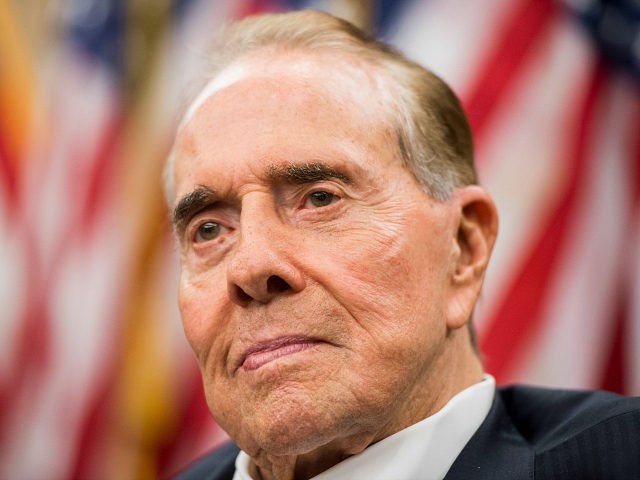The Wall Street Journal revealed on Monday that a key player in arranging the controversial phone call between President-elect Donald Trump and Taiwan’s President Tsai Ing-wen was none other than former Senator and 1996 presidential candidate Bob Dole.
Mr. Dole, in an interview, said the law firm he is affiliated with does work with the Taipei Economic and Cultural Representative Office in the U.S., and that the firm played a role in arranging the phone call.
“It’s fair to say that we may have had some influence,” Mr. Dole said.
An unnamed source familiar with the call told The Wall Street Journal it only lasted for about 12 minutes but was “planned weeks in advance” and included some discussion of “regional stability.”
A Buzzfeed hunt for sinister lobbying influence exerted by Taiwan through Dole came up with nothing beyond the $20,000 per month Dole’s law firm, Alston & Bird LLP, has been paid by the Taipei Economic and Cultural Representative Office for lobbying services and a letter from Dole with some unremarkable verbiage about how his firm was “prepared to undertake special assignments” for its client, “provided that they are mutually agreed to by both parties.”
“None of the documents examined by BuzzFeed News suggest that TECRO specifically asked Dole to broker the call with Trump, and neither Dole nor Trump’s transition team immediately responded to requests for comment on the matter. Taiwan’s Foreign Ministry did not answer calls for comment after business hours on Tuesday,” the Buzzfeed report states.
If Trump and Tsai (and Dole?) were hoping to rattle China’s cage with the call, it seems to have worked. The WSJ headlined its report by saying, “Donald Trump’s Message Sparks Anger in China,” but that anger proved to be more directed at Trump’s Twitter messages over the weekend than his chat with Tsai.
David Dollar, formerly the U.S. Treasury Department’s economic and financial emissary to China, told The Wall Street Journal that Trump’s phone call and tweets have caused a “tremendous amount of uncertainty” in Beijing. That seems like it might have been Trump’s objective, although Dollar warned that “diplomacy-by-Tweet” was not the best way to “meet U.S. objectives.”
“It was a message in the sense that Donald Trump is not necessarily going to be told what he can or can’t do because a foreign leader says so. That’s exactly the kind of thing that millions of Americans detest about Washington. If it’s going to cause some pain, then so be it,” said Stephen Yates, former national security adviser to Vice President Dick Cheney and former Mormon missionary to Taiwan.
Yates was a contributor to the exceptionally strong pro-Taiwan language in this year’s Republican Party platform, which reads as follows:
We salute the people of Taiwan, with whom we share the values of democracy, human rights, a free market economy, and the rule of law. Our relations will continue to be based upon the provisions of the Taiwan Relations Act, and we affirm the Six Assurances given to Taiwan in 1982 by President Reagan. We oppose any unilateral steps by either side to alter the status quo in the Taiwan Straits on the principle that all issues regarding the island’s future must be resolved peacefully, through dialogue, and be agreeable to the people of Taiwan.
If China were to violate those principles, the United States, in accord with the Taiwan Relations Act, will help Taiwan defend itself. We praise efforts by the new government in Taipei to continue constructive relations across the Taiwan Strait and call on China to reciprocate.
As a loyal friend of America, Taiwan has merited our strong support, including free trade agreement status, the timely sale of defensive arms including technology to build diesel submarines, and full participation in the World Health Organization, International Civil Aviation Organization, and other multilateral institutions.

COMMENTS
Please let us know if you're having issues with commenting.